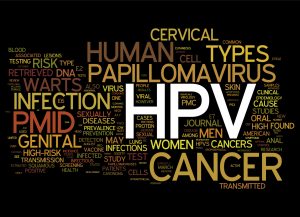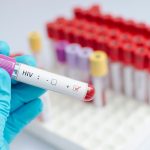 Human papillomavirus infection, or HPV, transmission can increase the risk of skin cancer, mouth cancer, and throat cancer, according to findings discussed by experts at Duke University and published in the well-respected medical journal PLOS.
Human papillomavirus infection, or HPV, transmission can increase the risk of skin cancer, mouth cancer, and throat cancer, according to findings discussed by experts at Duke University and published in the well-respected medical journal PLOS.
Every year, at least six million people in the United States get an HPV infection. In the majority of cases, the human papillomavirus clears up on its own in one or two years. However, there are some cases where the HPV infection goes on and on. In the past, experts thought that a person’s immune response helped clear up the infection, but research now seems to suggest that cell division has a lot to do with clearing HPV from the body.
Advertisement
The HPV infection spreads through skin-to-skin contact during sexual intercourse. The virus breaks through layers of cells that line the cervix as well as other tissues, and it infects stem cells in the inner layer, which is called the “basal layer”. Normally, when an infected cell divides into two, one of the cells stays in the basal layer, while the other cell makes its way into the upper layers, where it releases particles that can infect another person. However, sometimes cell division occurs. This is when an infected cell produces two cells that stay in the basal layer, or both cells push to the outer layer.
Duke researchers took a close look at cell division and after conducting tests discovered that 83 percent of the body’s ability to clear the HPV infection was attributed to patterns of cell division. Simply put, the longer the infected cells linger in the body, the longer HPV persists. This means, the more likely it can lead to cancers including, mouth cancer, throat cancer, and skin cancer.
Human papillomavirus (HPV) infection: a risk factor for skin cancer
The study at Duke is not the only research to link the human papillomavirus to skin cancer. A few years ago, a research team made up of experts from South Florida, Germany, and France found a connection between having antibodies to certain types of HPV and a specific form of skin cancer.
The researchers reported that cutaneous (skin-related) human papillomavirus, as opposed to HPV associated with cervical cancers, could be a risk factor for squamous cell carcinoma (SCC). This type of skin cancer develops in the thin, flat cells that make up the outer layer of the skin. While squamous cell carcinoma is usually not life-threatening, it can be aggressive in some cases.
The study was conducted using blood samples and tumor tissues from a university dermatology clinic. Some of the experts involved in the study theorize that the HPV infection has an impact on the repair of DNA in sun-damaged skin of certain people, an effect that then leads to an accumulation of mutations that predispose people to SCC.
HPV infection and the type of cancer
While skin cancer, throat cancer, and mouth cancer have been linked to the human papillomavirus, there are many other cancer types that doctors have long associated with the infection. Cervical cancer is the most serious issue linked to women with HPV. A large majority of cervical cancers are caused by HPV. It can be caught early through routine Pap tests.
Here’s a look at some other types of cancers associated with the HPV infection:
- Vaginal: seven out of 10 due to HPV
- Vulvar: seven out of 10 due to HPV
- Penile: six out of 10 due to HPV
- Anal: almost all cases in men and women due to HPV. More common in men with HIV.
HPV infection, treatments and prevention
 About 40 out of 100 HPV types are sexually transmitted. Is there a cure for HPV? The answer is no. But on the upside, the infection often clears up by itself. If is doesn’t, it is important to see a doctor. If you have ever wondered, can HPV be treated, it can. The treatment often focuses on the symptoms. In some cases, the symptoms might be warts. Warts don’t generally lead to cancer, but can be very uncomfortable. There are topical medications, as well as prescriptions that a doctor can suggest for HPV warts. A vaccine called Gardasil can protect against strains of HPV. It also protects against strains of the virus that can lead to cervical cancer. There is another vaccine, Cervarix, which protects against cervical cancer, but not the genital warts.
About 40 out of 100 HPV types are sexually transmitted. Is there a cure for HPV? The answer is no. But on the upside, the infection often clears up by itself. If is doesn’t, it is important to see a doctor. If you have ever wondered, can HPV be treated, it can. The treatment often focuses on the symptoms. In some cases, the symptoms might be warts. Warts don’t generally lead to cancer, but can be very uncomfortable. There are topical medications, as well as prescriptions that a doctor can suggest for HPV warts. A vaccine called Gardasil can protect against strains of HPV. It also protects against strains of the virus that can lead to cervical cancer. There is another vaccine, Cervarix, which protects against cervical cancer, but not the genital warts.
There are HPV infection treatment guidelines. The Centers for Disease Control and Prevention recommends HPV vaccination for girls and boys age 11 and 12 in three doses over a six-month period. If people are not fully vaccinated at this age, the recommendation is that girls and women through age 26 and boys and men through age 21 receive the vaccine.
Men who have sex with men can get the vaccine through age 26, and both men and women who have compromised immune systems can get it through age 26 if they weren’t able to get it when they were younger. Experts do point out that the vaccine is more effective if given before a person becomes sexually active.
Although we don’t hear much about it, HPV natural treatment is starting to get more attention. Part of this is due to a study published in the Asian Pacific Journal of Cancer Prevention. It reported effective results with two herbal approaches in treating HPV infection. One of the therapies was a vaginal cream containing extracts of curcurmin, reetha, amla, as well as aloe vera, and the other was a curcurmin capsule.
In terms of HPV natural treatment, many people have found the following helpful when it comes to warts: oregano oil, calendula oil, Pau’ d’Arco extract, and tea tree oil.
HPV is so common that most sexually active people will get the infection, at least one type, at some point in their lives. While some people won’t notice, and the infection will simply go away on its own, others will struggle with symptoms and require treatment. If it gets to the uncomfortable stage, it should be taken seriously. As outlined here, it can lead to serious consequences, so you shouldn’t leave it unchecked.
Related Readings:
Anti-retroviral therapy helps prevent serious HIV/AIDS diseases, study
Research indicates the early administration of anti-retroviral therapy (ART) plays a role in preventing serious AIDS-related diseases. The New England journal of Medicine has recently published the results of an in-depth study on the Strategic Timing of Anti-Retroviral Treatment (START) for AIDS.
The study was done by researchers from the National Institute of Allergy and Infectious Diseases (NIAID). The goal of the clinical trial was to find out if starting anti-retroviral treatment earlier would benefit all HIV-infected individuals. Continue reading…
Advertisement
Finally Barking Up the Right Tree to Cure Cancer, HIV and Alzheimer’s Disease
While Mother Nature is mostly taken for granted in these modern times, science still concedes that, once in a while, she can amaze us with some pretty incredible solutions for our most serious health problems. Thankfully, researchers are finally beginning to take notice of Mother Nature’s “alternative” medicine cabinet, opening their minds and research laboratories to some of the potential treatments and remedies it may hold that have as yet eluded the pharmaceutical industry. Some of their latest findings – especially those in the study of cancer, Alzheimer’s disease and even HIV – are nothing short of miraculous. Continue reading…
Sources:
https://today.duke.edu/2015/03/persistenthpv
http://www.sciencedaily.com/releases/2012/07/120702153117.htm
http://www.cancer.org/cancer/cancercauses/othercarcinogens/infectiousagents/hpv/hpv-and-cancer-info
http://www.medicalnewstoday.com/articles/246670.php?page=3
http://www.mayoclinic.org/diseases-conditions/hpv-infection/basics/prevention/con-20030343
http://www.greenmedinfo.com/blog/natural-herbal-hpv-cure-discovered
http://www.findhomeremedy.com/tips-to-cure-hpv-virus-naturally/
